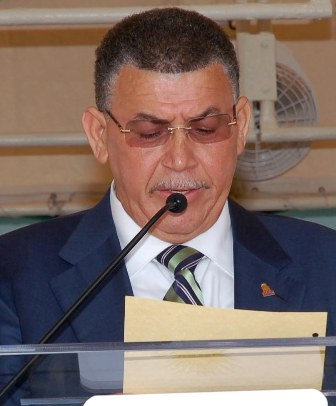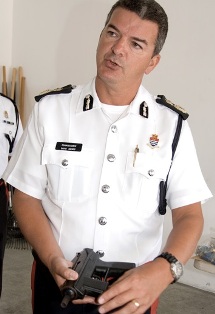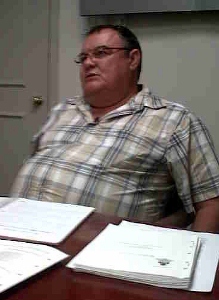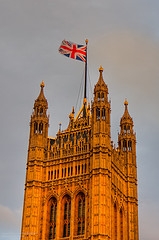Archive for November, 2011
Bush lobbies UK for support of financial sector
(CNS Business): The Cayman Islands premier delivered a letter to a member of the UK's treasury team in London Tuesday extolling the virtues of the islands' financial services and the jurisdiction's various international approvals. Ahead of signing a framework agreement with the British government committing to fiscal prudence, McKeeva Bush said he wanted to impress upon the UK and the rest of the world the standing of Cayman's financial services sector. Bush gave the letter to Exchequer Secretary David Gauke. It reportedly outlined acknowledgements Cayman has received from different supranational bodies that have assessed the jurisdiction’s compliance and regulatory regimes. Read more on CNS Business

Law means electric cars now in business
 (CNS Business): After waiting patiently formore than six years, local car dealer John Felder of Cayman Automotive said he was absolutely delighted that government has finally passed the new traffic law allowing cars powered by electricity rather than gas to drive on all of Cayman’s roads. Felder, the first person to sell electric cars in Cayman, is now working to open a chain of solar powered charging stations across the island to facilitate a greener future for local roads. Despite the amount of time it took for the legislation to finally reach the floor of the Legislative Assembly, Felder said he never gave up hope and had already begun importing the vehicles in anticipation. Read more on CNS Business
(CNS Business): After waiting patiently formore than six years, local car dealer John Felder of Cayman Automotive said he was absolutely delighted that government has finally passed the new traffic law allowing cars powered by electricity rather than gas to drive on all of Cayman’s roads. Felder, the first person to sell electric cars in Cayman, is now working to open a chain of solar powered charging stations across the island to facilitate a greener future for local roads. Despite the amount of time it took for the legislation to finally reach the floor of the Legislative Assembly, Felder said he never gave up hope and had already begun importing the vehicles in anticipation. Read more on CNS Business

FFA won’t stop port,Mac says
 (CNS): The UK will support the George Town Port cruise berthing project, the premier has said, despite speculation that the strict conditions of the financial framework agreement (FFA) it wants Cayman to sign could rule out the development. McKeeva Bush said the FCO is content that a proper business case evaluation would be enough to meet the conditions of the financial plan and that KPMG is already working on the report. Speaking in the country’s parliament on Friday about his impromptu meeting with the FCO minister, Henry Bellingham, Bush said that the UK would not stop the port but had indicated that government must slow down.
(CNS): The UK will support the George Town Port cruise berthing project, the premier has said, despite speculation that the strict conditions of the financial framework agreement (FFA) it wants Cayman to sign could rule out the development. McKeeva Bush said the FCO is content that a proper business case evaluation would be enough to meet the conditions of the financial plan and that KPMG is already working on the report. Speaking in the country’s parliament on Friday about his impromptu meeting with the FCO minister, Henry Bellingham, Bush said that the UK would not stop the port but had indicated that government must slow down.
“He affirmed that a properly developed business case evaluation of the much-maligned cruise facilities project would satisfy their procedural requirements,” Bush said about his meeting with the Overseas Territories minister in London on 14 November. “The process to produce such an evaluation is well underway and is central to our assessment of the capabilities of the developer and the overall viability and sustainability of the project,” he added, indicating that local auditors KPMG were doing the evaluation.
Bellingham would not be stopping the project, but Bush told his colleagues that the UK minister had indicated a need to slow down and complete the evaluation. The premier said that if his government was trying to rush through projects it was because he needed to stop the “disaster” of people losing their jobs, their homes and their business. “He says we must slow down … well, so be it,” Bush added.
Although the MOU the premier signed with China Harbour Engineering Company has now expired, Bush has not yet indicated when, or if, government still intends to move to a main agreement with the Bejing based firm.
The premier has said on a number of occasions recently at various public engagements that he intends to get the cruise port project done but has not revealed when that will be or what agreement government has come to with CHEC to ensure the Chinese owned firm will be able to recoup its investment, estimated to be as much as $300 million. CHEC is believed to be asking for a 51 year lease with retail concessions, as well as a significant share in the cruise line fees.
According to the agreement with the UK, which Bush is expected to sign this week while he is in London for the Overseas Territories Consultative Council, the local government cannot borrow any more money for capital projects and must finance further development from its general revenue.
The agreement also requires projects that will be financed through public-private partnerships to follow strict protocols, even if government is not putting up the initial cash, as is the case with the proposed cruise port project in George Town.
The UK is calling for government to see that “all projects, whether funded from recurrent surpluses, conventional borrowing or all alternative financing transactions, are suitably appraised before the procurement stage” to ensure value for money.
For projects with a lifetime value above CI$5m where the use of Pubic Private Partnerships (PPPs) or any other form of alternative financing is being considered, government must retain independent accounting, legal, financial, economic and environmental and other technical advice as appropriate to ensure robust investment appraisals are produced.
“The business case which results from the appraisal process should demonstrate the economic need for the project; include a fully argued and costed risk and impact assessment; and specify the benefits the project is designed to deliver to ensure that an informed decision can be made on whether or not to proceed to the procurement stage,” the agreement, which Bush has said he will sign, states.
The UK further requires government to make the evaluation of a project public and to follow a statutory procurement process, even with PPPs.
See draft Financial Framework Agreement below.

Cops get more power on guns
 (CNS): Planned changes to the country’s gun laws will allow police to hold people who they suspect of gun crimes for almost a month without having to charge them with an offence and will see them able to search homes, cars and people without a warrant if they suspect an illegal firearm maybe inside. Changes that law enforcement officials asked for in the wake of September’s spate of gang related killings, including a switch in the burden of proof where the defendant will need to proof he is not guilty, are expected to be debated by legislators at next month’s sitting of the Legislative Assembly, giving the police far reaching powers over people suspected of committing offences under the firearms law. (Photo Dennie Warren Jr)
(CNS): Planned changes to the country’s gun laws will allow police to hold people who they suspect of gun crimes for almost a month without having to charge them with an offence and will see them able to search homes, cars and people without a warrant if they suspect an illegal firearm maybe inside. Changes that law enforcement officials asked for in the wake of September’s spate of gang related killings, including a switch in the burden of proof where the defendant will need to proof he is not guilty, are expected to be debated by legislators at next month’s sitting of the Legislative Assembly, giving the police far reaching powers over people suspected of committing offences under the firearms law. (Photo Dennie Warren Jr)
The police had asked the authorities to review this law to give officers the power to search anyone they believe may have a gun without a warrant in the same way that they can search premises if they suspect individuals may have drugs.
The proposed amendment states: “ If a constable or customs officer has reasonable cause to suspect that any person is in possession of a firearm or bullet-proof vest in contravention of this Law he may, without warrant, detain and search such person and whether or not any person is detained or searched may, without warrant, break open and search any premises, vehicle, vessel or thing whatsoever in which he has reasonable cause to suspect that any such firearm or bulletproof vest may be concealed.”
The new law also makes a fundamental switch in the usual principles of justice and places the burden of proof on defendant’s facing charges in the court rather than the crown. Alleged offenders will now have to prove that an unlicensed a gun found in their car or home, for example, is not in their possession rather than the other way round. In future if a person is found with an illegal firearm on their premises they will have to explain why it is not their gun if they plead not guilty rather than the crown having to prove it is.
As well as the new powers to search people, based only on suspicion and not evidence, the police will also be able to keep suspects in custody for 14 days without charging them with a crime. They will then be able to apply to the court to extend that detention period for another two weeks giving police almost amonth before they need to come up with a crime to keep holding a suspect.
The amendments come as a result of requests made by the police who had stated that the laws they were using to deal with gang and gun crime were insufficient and prevented them being able to find illegal weapons.
David Baines, the RCIPS commissioner had called for what he described as “practical legislation” in September after five men were gunned down in eight days. He said he wanted to see the burden of proof switched from prosecutors to defendants and officers given the ability to make warrantless searches whenever and wherever they have grounds to suspect guns are hidden.
Asking for the barriers presented by the need for warrants and the need to prove a suspect has possession to be removed the commissioner said having the right legislation is important in the fight against gang crime.
Efforts to fight crime would be “meaningless” if the police could not carry out their investigations lawfully the senior officer had stated but was hopeful he would get the legislative changes as he said, “There is no lack of appetite to move forward on this.”
Some of the country’s legal profession, however, have raised questions about the constant encroachment by legislators on civil liberties in order to help law enforcement bolster weaker cases. One local attorney expressed the views of a number of lawyers when he said that changing laws to aid weak prosecution and poor police investigations will not stop the crime, just reduce the people’s rights.
“Oppressive laws can only lead to further and more extreme acts of criminality,” Peter Polack an outspoken critic, warned. He pointed out that the problem of passing such an amendment would be unveiled once an innocent friend, relative or child is arrested.
“If a firearm is found on a bus, is everyone to be arrested or just the driver?” the lawyer asked rhetorically as he pointed out the potential pitfalls in this type of legislation “If a firearm is found in a community meeting is everyone to be arrested or just the community leader? If the commissioner and 14 UK officers are on a North Sound cruise and an illegal firearm is discovered, are all to be arrested? We are already on the slippery slope and the leaders of non-performing institutions should be stepping aside instead of deflecting poor performance,” he added.

Miller not giving up on vote
 (CNS): The member for North Side is not giving up his fight to persuade government to change the election law to one man-one vote before the country goes to the polls in 2013. Besides seeking redress in the court system, Ezzard Miller said he would be filing another motion in the Legislative Assembly for next month’s meeting, this time calling for amendments to section 44 of the law as another way of achieving his goal. The silence on the government benches last week in response to his previous motion spoke volumes, Miller said, making it clear that government has no viable argument against one man-one vote.
(CNS): The member for North Side is not giving up his fight to persuade government to change the election law to one man-one vote before the country goes to the polls in 2013. Besides seeking redress in the court system, Ezzard Miller said he would be filing another motion in the Legislative Assembly for next month’s meeting, this time calling for amendments to section 44 of the law as another way of achieving his goal. The silence on the government benches last week in response to his previous motion spoke volumes, Miller said, making it clear that government has no viable argument against one man-one vote.
Speaking at a press conference on Monday afternoon at the Legislative Assembly, the independent member said he would continue to file motions right up until the parliamentary dissolution before the general election in 2013 if he had to, as he believed the majority of people in the Cayman Islands now supported the concept of casting one vote for one member to represent them.
Miller believes there is now much wider recognition in the community of the inequity of the current convoluted system than ever before and Cayman wants one man-one vote.
If government persists with plans revealed by the premier earlier this year to simply increase the number of members at the next election by adding two seats to George Town and one to Bodden Town, Miller said, McKeeva Bush and his three fellow West Bay members may have difficulty maintaining support for the multi-member system going into the next election.
For the first time, constituents in West Bay will have less influence over how many people are elected to power than their neighbours in the capital, who will, unless the law is changed, be able to return six people to the country’s seat of power compared to only four in West Bay.
He said that the silence of the government benches in the Legislative Assembly last Thursday, when not a single member of government rose to argue against Miller’s private members motion, shows how indefensible the government’s support of multi-member constituencies is. The silence in response to his motion was not only against all parliamentary protocol and extremely unusual, but Miller said he believed the government benches could do little else if they are not prepared to support the democratic principle of one man-one vote.
“Their silence illustrated that there is no argument of substance against single member constituencies,” Miller said. “It would have been reasonable for them, however, to let the public hear them defend their position and say why they voted against the motion.”
However, he pointed out that they would all get another chance to explain to their constituents why they are not supporting the basic principle of democracy when he brings his next motion and if necessary another one after that as well.
Surprised but undeterred by the silent response, Miller said that as far as he is concerned the legislation governing the country’s elections is now unconstitutional, as section 92 calls for people who are eligible to vote for “an elected member, not four,” he said again on Monday.
Determined to ensure that the election law becomes constitutional, he said, “I intend to keep on bringing this issue before parliament from now until the House is dissolved unless government addresses the issue.”
Well aware that the premier is fundamentally opposed to the principle of single member constituencies, Miller said the McKeeva Bush was not above the constitution and he intended to carry on with his campaign. Despite the likelihood of constant rejection and although he himself is already elected via the principle of one man-one vote as a result of representing a single member constituency, Miller said the fight was not to advance his own chances of winning an election but to do what was right.

Police charge West Bay teen over gun
(CNS): A West Bay teenager has been charged following the recovery of an illegal hand gun in the wake of a car smash last week. Sources have revealed that Robert Aaron Crawford, who was one of three men acquitted of the fatal shooting of Alrick Peddie just over four months ago, has been charged with possession of an unlicensed firearm after police apprehended him as he tried to escape from the scene of the crash on Esterly Tibbetts Highway at around 3am Friday. A police spokesperson confirmed Monday that a nineteen-year-old man will appear in court Tuesday over the weapon and ammunition found in the bushes close to where he was caught.
Crawford was one of two men arrested by officers from the Uniform Support Group after they followed what they said was a suspicious vehicle in the early hours of 18 November. The officers were on patrol in the area close to the Grand Pavilion, West Bay Road, when they noticed the car making off from the location. It drove along West Bay Road towards George Town and turned onto Esterly Tibbetts, where at a point close to the rear of the Ritz Carlton, the car collided with a road barrier. As the police approached the scene of the crash, two men ran away from the vehicle.
The officers pursued one of the men into the bush area and he was arrested when the gun and ammunition were found nearby. The weapon was not fired and no one was injured. The second man was arrested a short time later on suspicion of leaving the scene of an accident and police said this man remains in police custody while enquiries continue.
Crawford’s co-defendant in the Peddie murder, Jose Sanchez, was arrested only days after he was acquitted for possession of an imitation firearm and was scheduled to face trial this week in connection to the incident outside a West Bay bar, but the trial was postponed on Monday. Sanchez remains in custody after breaking his bail conditions and has now spent the best part of the four months back in Northward since his release in the wake of the murder trial .
In April 2010 Crawford and Sanchez, along with Deward Roger Bush, were charged with the murder of Peddie, who was gunned down in broad daylight in a West Bay yard last year, and all three were remanded in custody. The men remained in jail for well over one year until their acquittal this summer.
Anyone who has information that could assist the police with this or any other crime is asked to contact George Town police station on 949-4222, the RCIPS tip-line 949-7777 or the confidential Crime Stoppers number 800-8477(TIPS).

CS will want more benefits if charged for health cover
 (CNS): Government is currently reviewing the need for civil servants to start paying towards their own healthcare cover but they will want to see proof of extra benefits if they are forced to contribute, Dr Paulino Rodrigues, of the Cayman Islands Civil Servants Association, has said. The senior civil servant said that government workers don’t perceive healthcare as “free” but as a benefit of around $1,000 per family per month, in lieu of other perks common in the private sector such as share options or pay rises. “We would have to see deep discussion and proven benefits if we were required to pay an extra $500 a month, for example,” he said at last week’s national health conference.
(CNS): Government is currently reviewing the need for civil servants to start paying towards their own healthcare cover but they will want to see proof of extra benefits if they are forced to contribute, Dr Paulino Rodrigues, of the Cayman Islands Civil Servants Association, has said. The senior civil servant said that government workers don’t perceive healthcare as “free” but as a benefit of around $1,000 per family per month, in lieu of other perks common in the private sector such as share options or pay rises. “We would have to see deep discussion and proven benefits if we were required to pay an extra $500 a month, for example,” he said at last week’s national health conference.
Speaking on a panel looking at the patients’ role in reducing healthcare costs at the government sponsored Healthcare 20/20 conference atThe Ritz-Carlton, Rodrigues told the audience that if local civil servants are to contribute to their healthcare, as private sector employees in the islands was required to do, they need to see something for it.
Healthcare covering civil servants, veterans and seafarers and indigents cost the government $93.4 million in the 2009-2010 financial year, or just less than one fifth of the total budget, a figure which both the premier and the health minister have stated is unsustainable.
Jennifer Ahearn, the health ministry’s chief officer, said they were currently reviewing expenditure in all areas, and looking at whether civil servants should pay something towards their healthcare and their overall benefits package in general was definitely “on the table”.
The preliminary findings of a civil service survey revealed that most civil servants are relatively happy with their present healthcare coverage from the government’s health insurance provider, CINICO. But they are not satisfied with waiting times and have issues with the quality of care and lack of specialist service.
Rodrigues presented these initial findings to the audience, sayingthat he represented the 4,000 civil servants and their dependents, which totaled between 12,000 and 15,000 individuals, or about 20 per cent of the population. The survey of 30 questions was sent to all civil servants and they had so far received responses from about 20 per cent of them, which he said was “pretty good”.
Talking about the liability of civil servants when it came to healthcare costs, Rodrigues said that most civil servants were healthy and that most healthcare costs came from the very young and the elderly. “The vast majority of civil servants don’t use the healthcare system that often, only about 4 per cent,” he said.
He did concede, however, that about a quarter of civil servants or their dependents had pre-existing conditions which required long term healthcare provisions. Rodrigues added that the civil service was open and willing to look at where costs were coming from. “We will work with the Ministry of Health, CINICO and the Health Services Authority, whoever can help to reduce costs,” he said.

Young boxer takes on second pro challenge
 (CNS): Local pro boxer Peter “Lightning” Lewison will be fighting his second professional boxing match against Florida’s Brant Skyler on Saturday 26 November. The 24-year-old Caymanian boxer, following in the footsteps of his role model, Caymanian boxer Charles “Killa” Whittaker, made the transition from amateur to professional boxer in June this year when he fought his first professional fight, alongside Whittaker, in “Ambush” at Camana Bay. Lewison knocked out Florida fighter Alex Lubo in the second round, despite Lubo’s greater experience. As an amateur boxer, Lewison excelled in the New York Golden Gloves competition and spent time training at the world famous Gleasons Gym in New York, which has trained world class boxers such as Mike Tyson.
(CNS): Local pro boxer Peter “Lightning” Lewison will be fighting his second professional boxing match against Florida’s Brant Skyler on Saturday 26 November. The 24-year-old Caymanian boxer, following in the footsteps of his role model, Caymanian boxer Charles “Killa” Whittaker, made the transition from amateur to professional boxer in June this year when he fought his first professional fight, alongside Whittaker, in “Ambush” at Camana Bay. Lewison knocked out Florida fighter Alex Lubo in the second round, despite Lubo’s greater experience. As an amateur boxer, Lewison excelled in the New York Golden Gloves competition and spent time training at the world famous Gleasons Gym in New York, which has trained world class boxers such as Mike Tyson.
Saturday’s event looks set to be an exciting one, also featuring undercard fights by local up and coming amateur boxers Thomas McField, Aaron Powell and Dariel Ebanks.
Doors open at 6:30pm at the D Dalmain Ebanks Boxing gym in the Truman Bodden Sports Complex. Tickets are available now. Call 927 0092 or visit www.lightninglewison.com for further details.

Government’s young politicians back Dart deal
 (CNS): The youth branch of the country’s ruling party has said that it supports the ForCayman Investment Alliance, a controversial deal the government proposes to sign with the Dart Group. While admitting that not everyone in the Young United Democratic Party (YUDP) is in favour of all aspects of the deal, the president believes that overall the plan is a good one for Cayman. Richard Christian said that after the YUDP reviewed the proposal, it felt the deal would stimulate what he described as a stagnant economy. The young potential future politician said the YUDP also wanted to be sure Caymanians would be given priority for employment in the projects relating to the deal.
(CNS): The youth branch of the country’s ruling party has said that it supports the ForCayman Investment Alliance, a controversial deal the government proposes to sign with the Dart Group. While admitting that not everyone in the Young United Democratic Party (YUDP) is in favour of all aspects of the deal, the president believes that overall the plan is a good one for Cayman. Richard Christian said that after the YUDP reviewed the proposal, it felt the deal would stimulate what he described as a stagnant economy. The young potential future politician said the YUDP also wanted to be sure Caymanians would be given priority for employment in the projects relating to the deal.
“While not everyone supports all aspects of the partnership, including some YUDP members, we recognized the importance of the alliance and overall benefits," said Christian. “You will rarely get all people to agree on a subject but we at times have to do what’s in the best interest for the majority.”
The YUDP said there were several reasons why it would support the alliance, including Dart’s promise of a new waste management facility in Bodden Town and the capping and remediation of the existing dump in George Town. The party also said it welcomed the commitment from the developer of some $18 million in cash for education, housing and community projects.
Christian admitted that although there was much controversy over the West Bay Corridor Projects, which include enhancements to Public Beach, the extension of the Esterley Tibbetts Highway and the redevelopment of a new 4-5 star hotel in place of the Courtyard Marriott Hotel, the membership is in favour of expanding the public beach and the closure of the West Bay Road.
“I see no real threat or detriment in having the proposed road closed,” added Christian.
The YUDP leader said the deal had enormous economic implications for the country and would facilitate infrastructure projects that otherwise would not get the funding. “Some say we are giving too much away. I don’t think so. Had we addressed these infrastructure projects before now, there may not have been the need for this partnership.”
Offering support for the independent financial and legal review that government has said will be part of the due diligence process, Christian said he believed the Dart Group had demonstrated that it was committed to making Cayman a better place for the future.
“I admit, when I first heard about Dart in the mid 90’s, it wasn’t anything good,” Christian stated. “I now realize it was all negative propaganda. They have proven themselves to be a great corporate citizen, employing over 500 persons, 60% Caymanians, and donating millions of dollars each year to local charities.”
The president said the young political party would be seeking assurances from the government that Caymanian companies and workers would be given priority for employment. “We have persons losing their homes and can't put food on the table for their families. We need to really look at the overall benefits in this alliance and get these projects going so persons can provide for their families and get back their dignity,” the YUDP President added.
Government announced its intention to enter into the deal with Dart in June, more than five months ago, and has since reportedly been involved in negotiations towards signing the final agreement. As yet, the full details have not been revealed nor has a date when government expects the deal to be finalized.

Cayman ‘let down’ by UK
 (CNS): Although the majority of Caymanians want the islands to remain a territory of the United Kingdom, many feel that in recent years the relationship has not been a positive one and the UK has let Cayman down. The committee tasked with collecting the opinions of the people about the future of the relationship for a new UK white paper revealed their findings in a report of its review published Friday. Among their many other findings, the report reveals a clear contradiction that the committee said would be difficult to balance. On the one hand there is a strong desire for more local autonomy from the British but on the other hand the people want the UK to act as a stronger check on their own government.
(CNS): Although the majority of Caymanians want the islands to remain a territory of the United Kingdom, many feel that in recent years the relationship has not been a positive one and the UK has let Cayman down. The committee tasked with collecting the opinions of the people about the future of the relationship for a new UK white paper revealed their findings in a report of its review published Friday. Among their many other findings, the report reveals a clear contradiction that the committee said would be difficult to balance. On the one hand there is a strong desire for more local autonomy from the British but on the other hand the people want the UK to act as a stronger check on their own government.
Although only a few people believed that the UK-Cayman relationship had broken down completely, many believed that the UK had not represented Cayman’s best interests on the international stage, with the parties appearing to be at “loggerheads”.
Among the many issues the review uncovered was the belief in the community that when the Cayman Islands came under pressure from the international financial community, it was let down by a failure on the part of the United Kingdom government to fully represent the interests of Cayman and protect them where necessary.
However, the report also found that people believe the relationship with the UK creates an image of stability for the financial services industry and there were concerns that steps towards the independence of the Cayman Islands would almost certainly result in a major loss of confidence in the sector.
During the review the committee saw that Caymanians were interested in pursuing not just a “greater awareness of precisely what the United Kingdom can provide by way of assistance”, but also ways in which this relationship could be nurtured and become more productive.
“An improved relationship is likely to require a process of mutual education, with the United Kingdom and its people needing to learn about and better understand the various Territories and their distinct features; as opposed to a one-way process where the people of the Territories merely had to come to terms with what the United Kingdom prescribes,” the report stated.
Like the findings of the Foreign Affairs Committee of the United Kingdom Parliament, the reviewers said people want the UK and Overseas Territories relationship to be based on something more than an annual meeting of the Overseas Territories Consultative Council. "Properly consulting and representing the Overseas Territories in issues that affect them is an important part of creating the type of ‘modern partnership’ which may prevent the need for direct intervention,” the report said.
The committee found a significant contradiction in the community, with a desire for more control for Cayman to govern itself but at the same time more checks on the potential excesses of those elected to office and the administrative arm of government.
“What is sought is an additional check on local governance as part of the overall balance in the constitutional arrangements,” the report revealed, while at the same time seeking greater local autonomy. “In some senses these may well be straining in different directions, although there is nothing to say that more local autonomy could not be ceded, while at the same time establishing a relationship that effectively builds in the necessary controls.”
Although not expressed in technical terms, the option of a free association agreement, somewhat akin to the position in Bermuda, which has not previously been made available to Cayman, was an idea commonly put forward in the wider community, the committee found.
When it came to good governance, the report says that the community welcomes and wants greater transparency and accountability from its government. “This sentiment was manifest both in the context of procurement and in the operation of boards and committees appointed by government," the report said, adding that the people called for elected officials and senior civil servants to be subject to enhanced provisions to reveal and prevent conflicts of interest.
The review heard calls for more stringent application of anti-corruption laws and increased checks and balances to be enshrined in the constitution because, the public said, even the perception of corruption is potentially damaging, not least because this can deter investment and inhibit development.
Many people also said the formalization of party politics is a problem for Cayman as it is too small to sustain two or more different parties. The party system was described as too divisive, feeding patronage and creating unnecessary animosity. But the people also made it clear they want more political say and that it was important to engage people in the political process. There were evident concerns “that people need to be free to express themselves without fear of victimization and intimidation.”
When it comes to economic development, the report reveals there are suspicions of the concessions provided to the so-called “big names” and there was a call for more support for small business and innovation.
There is a desire to enhance the relationship between the Cayman Islands and the United Kingdom, the report found, and an interest in greater local governance, while at the same time ensuring that every necessary check is in place to guarantee that there is good governance and transparency.
The report will form the basis of the Cayman Islands premier’s position on behalf of the Cayman people when talks about the new white paper begin in London this week at the Overseas Territories Consultative Council. The UK has also received feedback from all its territories via the open website, which has enabled everyone to freely comment about the future of the UK and its last remaining territories.
Premier McKeeva Bush said Friday that he would present a copy of the report to Henry Bellingham, the UK’s FCO minister with responsibility for the territories, as well as his colleagues at the council meeting. Since the aim of the exercise is to improve and strengthen Cayman’s relationship with the UK, Bush said Cayman was willing to change, such as in areas of procurement, but “we are not going to sit still or be taken advantage of,” he added.
See full report below.